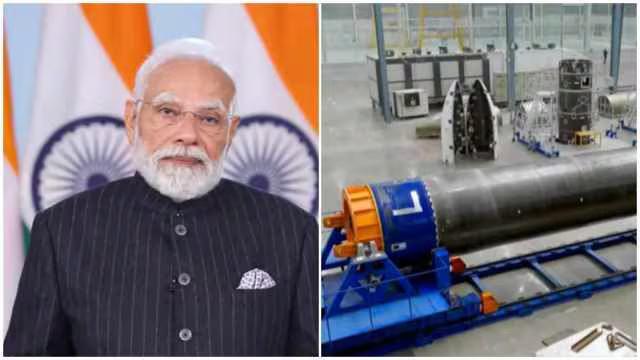
PM Modi Unveils Vikram-1, India’s First Privately Developed Orbital Rocket
In a historic moment for India’s space sector, Prime Minister Narendra Modi on Thursday inaugurated the new Infinity Campus of space startup Skyroot Aerospace via video conferencing. The highlight of the event was the unveiling of Vikram-1, India’s first privately developed orbital rocket. This milestone marks a significant leap forward for the country’s space industry, with the Prime Minister himself acknowledging the importance of this achievement.
The Infinity Campus, which was inaugurated by PM Modi, is a state-of-the-art facility that will serve as the backbone of Skyroot Aerospace’s operations. The campus is designed to be a hub for innovation and production, with the capacity to produce one rocket every month. This is a remarkable feat, considering the complexity and precision required in the development of orbital rockets. Skyroot Aerospace’s Founder, Pawan Chandana, expressed his enthusiasm for the new facility, highlighting its potential to revolutionize the space industry in India.
The unveiling of Vikram-1, India’s first privately developed orbital rocket, is a testament to the country’s growing capabilities in the space sector. The rocket, named after the father of India’s space program, Vikram Sarabhai, is a symbol of the nation’s commitment to pushing the boundaries of space exploration and development. PM Modi, during the launch, emphasized the significance of this achievement, stating that it marks a major milestone in the country’s space journey.
The development of Vikram-1 is a result of the tireless efforts of the team at Skyroot Aerospace, who have worked relentlessly to design, build, and test the rocket. The rocket’s capabilities and features are a testament to the team’s expertise and dedication to their craft. With the successful development of Vikram-1, India has joined an exclusive club of countries with the capability to develop and launch orbital rockets.
The implications of this achievement are far-reaching, with the potential to transform the space industry in India. The development of orbital rockets will enable the country to launch its own satellites, reducing dependence on foreign agencies and saving valuable resources. Additionally, the establishment of a private space industry will create new opportunities for innovation, employment, and growth, contributing to the country’s overall economic development.
The role of the government in supporting the private space industry has been instrumental in facilitating this achievement. The Indian government has been actively promoting the development of the space sector, providing necessary support and resources to startups and private companies. The establishment of the Indian National Space Promotion and Authorization Centre (IN–SPACe) is a notable example of the government’s efforts to encourage private participation in the space industry.
The inauguration of the Infinity Campus and the unveiling of Vikram-1 have sent a strong message to the world about India’s capabilities and intentions in the space sector. The country is poised to become a major player in the global space industry, with a growing number of startups and private companies contributing to its growth. As PM Modi stated during the launch, this is a significant leap forward for India’s space sector, and the country is ready to take on new challenges and explore new frontiers in space.
In conclusion, the unveiling of Vikram-1, India’s first privately developed orbital rocket, marks a historic moment for the country’s space sector. The achievement is a testament to the capabilities of Indian startups and private companies, and the government’s support for the industry. As India continues to push the boundaries of space exploration and development, the world can expect to see more innovative achievements from the country’s space sector.





